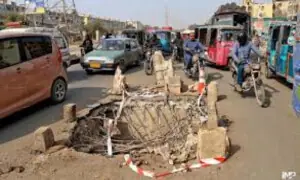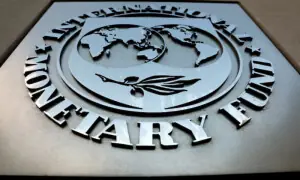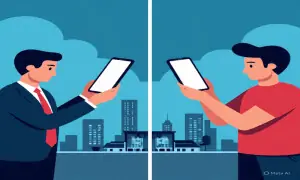The People’s Bus Service and our mental health
4 min readOn Monday, Bilawal Bhutto inaugurated the People’s Bus Service in Karachi. These buses—air conditioned and with Wi-Fi—will travel across seven routes in the city and are expected to create more than 3000 jobs. Hopefully, they will also reduce traffic, contributing to the better mental and physical health of us people.
The lack of proper public transportation has been an eternal problem in Pakistan. While we hear of people using the subway abroad, in Pakistan, there is no reasonable alternative. The colorful, public buses that we see on the road are often crowded, mostly with men, who are praying for their destination to arrive quickly, drenched in sweat, suffocating in the oppressive vehicle.
As a woman, traveling becomes more difficult unless you have private transport. In my entire life, I have never traveled on a public bus unless it’s been hired by the school administration for field trips. However, many women can’t afford to steer clear of the meager public transport options.
The difficulty of traveling is just one consequence of inadequate public transportation. Another consequence is road congestion as automobile dependence increases among those who can afford cars.
Fewer cars, happier city
If you are a city person and also an introvert, then you might have felt the need, at some point, to disappear into the countryside and stay there for some time to rejuvenate your slowly dying brain. One of the main reasons for this temptation is the noise created by the traffic.
Studies have shown that road traffic noise causes annoyance and interferes with sleep, communication, concentration, and even enjoyment of TV. It also interferes with learning in schools and might reduce work efficiency.
On the other hand, air pollution created by traffic is hazardous for both physical and mental health. A global study, which collected data from sixteen countries, showed that the air pollution created by road traffic might increase the risk of depression and anxiety. While air pollution is not listed as a cause of these conditions, evidence from similar studies shows that the two might be closely linked.
Additionally—and I am sure we are all aware of this—road congestion directly impacts our mental health. Being stuck in traffic jams for long stretches is stressful and increases anxiety. The impact of this stress can then spill over into our relationships too, to the extent, that domestic violence has been linked with traffic stress (though, that is certainly not an excuse for domestic violence).
People themselves identify cars as the “saddest” elements of urban spaces. Humans, who started as hunter-gatherers closely connected to nature, find it difficult to stay happy in artificial landscapes. That’s why early urban designers were obsessed with the “garden city” models, which allowed for a higher percentage of green spaces in cities than we see now.
Sustainable modes of travel
Technology is great, but it turns out that walking and cycling are better for our physical and mental health, even if they are not practical for long-distance traveling. Nevertheless, if we just depend on walking/cycling to get to places relatively closer to us, we might be able to contribute to a sustainable and healthier environment.
However, these ways of traveling aren’t exactly encouraged by the atmosphere of the city. The high number of cars on the roads makes walking dangerous, which is why parents often prefer to send their children to school in cars, vans, or buses. Street crime is another reason the roads aren’t welcoming to the walker or cycler. And then, there is the constant fear of being cat-called and harassed, which is why women are reluctant to walk.
Similarly, the volatile traffic of the city doesn’t create the most conducive environment for cycling. Cyclists do exist on the roads of Karachi but the sight of them is rare, and the few people who do use cycles are exclusively male.
It’s a shame that apart from public transport, these facilities aren’t available to residents either. Less traffic on the road might have created a better urban experience.
A “happy city”, according to people themselves, is greener, quieter, and slower. The fast city life is built to keep up with capitalism’s speedy engines, but a contemplative life might be more beneficial for our declining mental health.
The move towards a happier city however is bound to be slow. We have more trying problems to fix in the meantime. The People’s Bus Service might be a good step, then, towards not just creating less congested roads, but also towards providing transportation to those lower-income people who are stuck in public buses, struggling to breathe.
For the latest news, follow us on Twitter @Aaj_Urdu. We are also on Facebook, Instagram and YouTube.


























Comments are closed on this story.